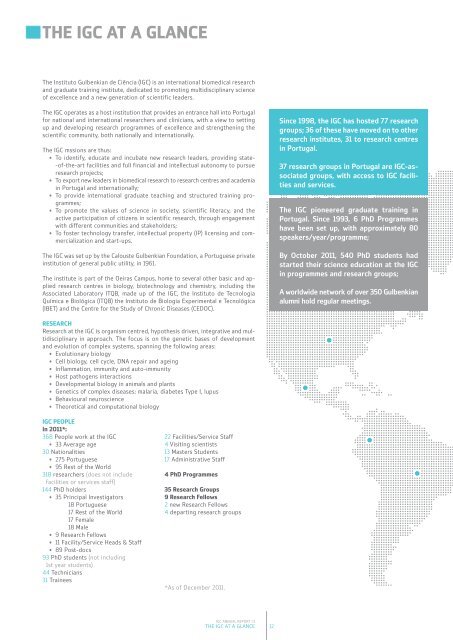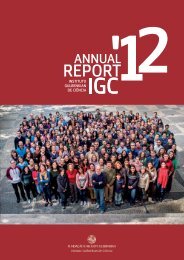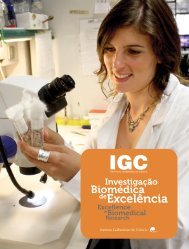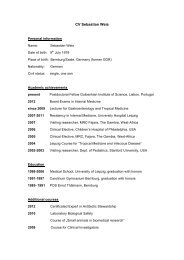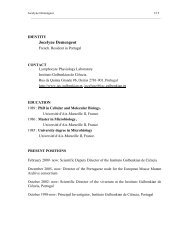organisation - the Instituto Gulbenkian de Ciência
organisation - the Instituto Gulbenkian de Ciência
organisation - the Instituto Gulbenkian de Ciência
- No tags were found...
You also want an ePaper? Increase the reach of your titles
YUMPU automatically turns print PDFs into web optimized ePapers that Google loves.
THE IGC AT A GLANCE<br />
The <strong>Instituto</strong> <strong>Gulbenkian</strong> <strong>de</strong> Ciência (IGC) is an international biomedical research<br />
and graduate training institute, <strong>de</strong>dicated to promoting multidisciplinary science<br />
of excellence and a new generation of scientific lea<strong>de</strong>rs.<br />
The IGC operates as a host institution that provi<strong>de</strong>s an entrance hall into Portugal<br />
for national and international researchers and clinicians, with a view to setting<br />
up and <strong>de</strong>veloping research programmes of excellence and streng<strong>the</strong>ning <strong>the</strong><br />
scientific community, both nationally and internationally.<br />
The IGC mssions are thus:<br />
• To i<strong>de</strong>ntify, educate and incubate new research lea<strong>de</strong>rs, providing state-<br />
-of-<strong>the</strong>-art facilities and full financial and intellectual autonomy to pursue<br />
research projects;<br />
• To export new lea<strong>de</strong>rs in biomedical research to research centres and aca<strong>de</strong>mia<br />
in Portugal and internationally;<br />
• To provi<strong>de</strong> international graduate teaching and structured training programmes;<br />
• To promote <strong>the</strong> values of science in society, scientific literacy, and <strong>the</strong><br />
active participation of citizens in scientific research, through engagement<br />
with different communities and stakehol<strong>de</strong>rs;<br />
• To foster technology transfer, intellectual property (IP) licensing and commercialization<br />
and start-ups.<br />
The IGC was set up by <strong>the</strong> Calouste <strong>Gulbenkian</strong> Foundation, a Portuguese private<br />
institution of general public utility, in 1961.<br />
The institute is part of <strong>the</strong> Oeiras Campus, home to several o<strong>the</strong>r basic and applied<br />
research centres in biology, biotechnology and chemistry, including <strong>the</strong><br />
Associated Laboratory ITQB, ma<strong>de</strong> up of <strong>the</strong> IGC, <strong>the</strong> <strong>Instituto</strong> <strong>de</strong> Tecnologia<br />
Química e Biológica (ITQB) <strong>the</strong> <strong>Instituto</strong> <strong>de</strong> Biologia Experimental e Tecnológica<br />
(IBET) and <strong>the</strong> Centre for <strong>the</strong> Study of Chronic Diseases (CEDOC).<br />
Since 1998, <strong>the</strong> IGC has hosted 77 research<br />
groups; 36 of <strong>the</strong>se have moved on to o<strong>the</strong>r<br />
research institutes, 31 to research centres<br />
in Portugal.<br />
37 research groups in Portugal are IGC-associated<br />
groups, with access to IGC facilities<br />
and services.<br />
The IGC pioneered graduate training in<br />
Portugal. Since 1993, 6 PhD Programmes<br />
have been set up, with approximately 80<br />
speakers/year/programme;<br />
By October 2011, 540 PhD stu<strong>de</strong>nts had<br />
started <strong>the</strong>ir science education at <strong>the</strong> IGC<br />
in programmes and research groups;<br />
A worldwi<strong>de</strong> network of over 350 <strong>Gulbenkian</strong><br />
alumni hold regular meetings.<br />
RESEARCH<br />
Research at <strong>the</strong> IGC is organism centred, hypo<strong>the</strong>sis driven, integrative and multidisciplinary<br />
in approach. The focus is on <strong>the</strong> genetic bases of <strong>de</strong>velopment<br />
and evolution of complex systems, spanning <strong>the</strong> following areas:<br />
• Evolutionary biology<br />
• Cell biology, cell cycle, DNA repair and ageing<br />
• Inflammation, immunity and auto-immunity<br />
• Host pathogens interactions<br />
• Developmental biology in animals and plants<br />
• Genetics of complex diseases: malaria, diabetes Type I, lupus<br />
• Behavioural neuroscience<br />
• Theoretical and computational biology<br />
IGC PEOPLE<br />
In 2011*:<br />
368 People work at <strong>the</strong> IGC<br />
• 33 Average age<br />
30 Nationalities<br />
• 275 Portuguese<br />
• 95 Rest of <strong>the</strong> World<br />
318 researchers (does not inclu<strong>de</strong><br />
facilities or services staff)<br />
144 PhD hol<strong>de</strong>rs<br />
• 35 Principal Investigators<br />
18 Portuguese<br />
17 Rest of <strong>the</strong> World<br />
17 Female<br />
18 Male<br />
• 9 Research Fellows<br />
• 11 Facility/Service Heads & Staff<br />
• 89 Post-docs<br />
93 PhD stu<strong>de</strong>nts (not including<br />
1st year stu<strong>de</strong>nts)<br />
44 Technicians<br />
31 Trainees<br />
22 Facilities/Service Staff<br />
4 Visiting scientists<br />
13 Masters Stu<strong>de</strong>nts<br />
17 Administrative Staff<br />
4 PhD Programmes<br />
35 Research Groups<br />
9 Research Fellows<br />
2 new Research Fellows<br />
4 <strong>de</strong>parting research groups<br />
*As of December 2011.<br />
IGC ANNUAL REPORT ‘11<br />
THE IGC AT A GLANCE<br />
12


